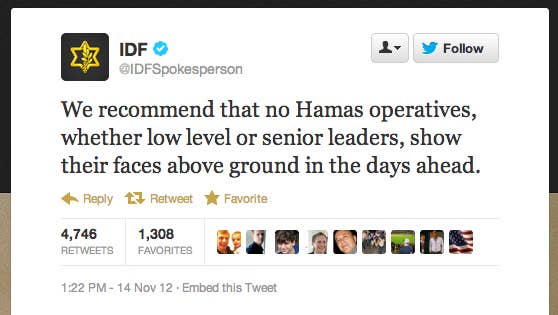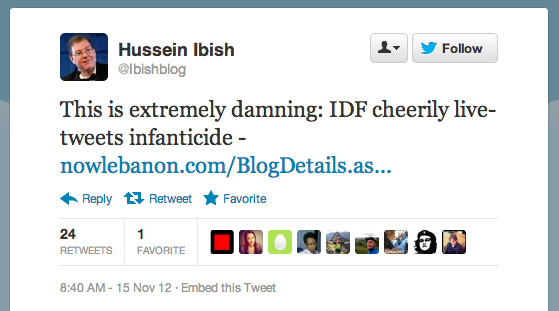
With a series of striking posts, and a real military escalation in Gaza, the Israel Defense Forces' English language Twitter account has been visible to hundreds of thousands, if not millions, of people this week. On Wednesday, it posted a particularly eye-catching message:

This was accompanied by another tweet touting the targeted assassination of Hamas commander Ahmad Jabari, followed by a YouTube video of the strike. The posts have drawn both praise and sharp criticism for their brazen tone and violent subject matter. Hussein Ibish, Senior Fellow at the American Task Force on Palestine, tweeted shortly after:

Most commentators simply noted how strange it was to see messages about military operations on Twitter. Others said this was inevitable. Writing at CNET, Charles Cooper said "If you're surprised, you haven't been paying attention."
The account has since doubled its followers.
Lt. Col. Avital Leibovich, the Israel Defense Forces Spokesperson to the international press, told BuzzFeed FWD that she is "very proud" of what the IDF has accomplished on social media. "We still have a lot more to learn," she said, "and maybe other platforms to join, but I think in a relatively short time it's very progressive."
Leibovich is in charge of the account, though she doesn't tweet directly from it — that falls to an anonymous "team of soldiers and officers," according to Eytan Buchman, who works with Leibovich. She manages the IDF's entire social media outreach operation, which bears a striking resemblance to that of a political campaign, corporation or news organization. She was the one who, in 2008, started the IDF's YouTube account, which has racked up tens of millions of views. (It was actually a month before the Cast Lead operation," she recalled, referring to a bloody three-week conflict that began in December of that year).
The YouTube account was followed quickly by a Flickr account, a blog, Twitter and Facebook accounts. "The goal," said Leibovich, "is to reach as many audiences as possible, and second, to convey our message, without the touch of an editor." Messaging is messaging, in other words.
She said she's only somewhat surprised by the attention the @IDFSpokesperson account, which is one of a vast array of Twitter accounts maintained by the IDF, has had this week. "The surprise has been the extent of the people that are following us — we have them by the thousands every hour."
Leibovich rejects criticism that the messages have been cavalier in their discussion of violence — when asked if she thought the use of the "language of war" on a platform most people use for entertainment and light news was appropriate, she defied me to give her an example. Asked directly about the "faces above ground" post from Wednesday, Leibovich balked. "You call this violent language?"
"When rockets are falling on ours heads, and I'm referring to 500 rockets in the last 72 hours, if you can even imagine the extent," she said, "then when you have certain time that you want to convey a message of deterrence to an audience, then that's a good tool to do it."
"As long as you respect the rules of engagement of that specific platform," she added, referring to claims that the posts may have constituted direct threats of violence, and therefore violated Twitter's terms of service. (Twitter has so far declined to comment on this issue.)
"It's a unique tweet, you haven't seen anything like it in the following days, or in the previous days," she said, noting the the @IDFSpokesperson account is over two years old and typically posts non-conflict-related tweets. "I don't find really any problem with that."
"There are so many opinion shapers and world leaders and parliament members all over the world that are using Twitter," she said, "I find it an essential tool to reach audiences and we use it constantly... I really don't see how it could not be serious — I don't think so."
Still, this is new territory both for both the IDF and Twitter; the platform has dealt with plenty of advertising and propaganda before, but now we're talking about war. The site isn't very popular in Israel, but the IDF's ranks are packed with young social media natives. Many soldiers have taken to Instagram in the last week, providing a surreal, utterly familiar glimpse of a youthful, conscripted army preparing for conflict.
Leibovich told BuzzFeed that she sees this as an asset, and a source of guidance. "One of the advantages that I have maybe compared to others," she explained, "is the fact that I have 18-year-olds."
"When [we recruit] the soldiers they're 18... the age of someone who was almost born into social networks," she said. "The creative side of the language almost comes natural."
